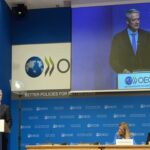
The United Nations marked the International Day of Families 2025 with a dynamic gathering at its Headquarters, showcasing the growing role of youth-led research and civil society in shaping global family policy. A key highlight was the participation of Francisca Lawson Tettevie, a doctoral student at the University of Nebraska-Lincoln and a representative of the International Federation for Family Development (IFFD), who participated in the panel discussion with a powerful address emphasizing the value of youth engagement in sustainable development policymaking.
Representing a network of 44 young researchers from 18 countries participating in the IFFD Working Groups, Tettevie outlined how emerging scholars are contributing substantive research and innovative proposals to the lead-up of the Second World Summit for Social Development, to be held in Doha this November. “Families are not just recipients of policy—they are shapers of development outcomes,” she stated, calling for inclusive frameworks that reflect the lived realities of diverse families worldwide.
The 2025 observance, organized by the UN Department of Economic and Social Affairs (DESA) under the theme “Family-Oriented Policies for Sustainable Development,” provided a platform for expert analysis on how family policies are reflected in Voluntary National Reviews (VNRs), regional experiences, and responses to global megatrends such as climate change, migration, and digital transformation.
Panelists included leading academics and policy experts such as:
– Prof. María del Rosario Esteinou Madrid (CIESAS, Mexico), who delivered the keynote on the evolution of family structures in Latin America;
– Prof. Vivian Lou Weigun (University of Hong Kong), highlighting Asian strategies for integrating family policies into social development planning;
– Anna Nagy, Founder of the Single Parent Families Foundation (Hungary), who offered practical approaches for supporting vulnerable households;
– Dr. Patricia Debeljuh, Director of the Work-Family Balance Center (Argentina), who addressed corporate and governmental responsibility in promoting family wellbeing.
– Francisca Lawson Tettevie, a doctoral student at the University of Nebraska-Lincoln
 Questions
Questions
The session culminated in an engaging Q&A, during which Dr. Jose Alejandro Vázquez Alarcón, Director of International Relations at IFFD, raised a crucial question to the panel:
“With all the evidence-based recommendations, what steps are we to put in place to ensure they are not only heard, but implemented and enforced in national policies?”
This question struck a chord with both panelists and attendees, reinforcing a recurring concern: the gap between robust evidence and actual policy implementation. It underscored the need for accountability frameworks, multi-stakeholder collaboration, and clear follow-up mechanisms at both national and international levels.
As the global community prepares for the Second World Summit for Social Development, the 2025 observance served not just as a reflection on progress, but as a call to action. Stakeholders emphasized that family-oriented policies are not auxiliary, but central to achieving the 2030 Agenda for Sustainable Development.
For IFFD and its youth-led initiatives, this day marked not only a recognition of the family as a driver of change—but a reminder that global goals must be rooted in local realities, and that implementation must match ambition.
To learn more about the event and future family policy discussions, visit the UN DESA Division for Inclusive Social Development website.





